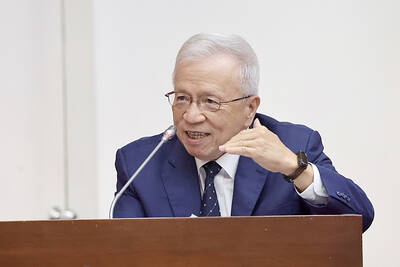Talks about a common currency took the backseat here this weekend, with Asia's financial elite focusing on developing the bond market as a steadier source for the region's massive funding needs.
Bonds, which received relatively less attention at previous meetings of the Asian Development Bank (ADB), was the buzzword among finance officials and corporate executives gathered in this South Korean resort island.
In an attempt to attract foreign interest, East Asian finance ministers Saturday launched a Web site that would serve as a one-stop clearinghouse for information on the bond issues.
Bonds are securities representing debts issued by governments or large corporations to finance projects or businesses. Terms can range from one to three months to as long as 30 years.
The bond market provides an opportunity to tap into Asia's massive savings which if invested within the region could reduce exposure to external shocks.
While there had been discussions about the prospects of a single East Asian monetary unit here, the consensus was that it remained a few decades away and that efforts should be geared toward developing capital markets, stabilizing exchange rates and improving a web of bilateral currency swaps.
"The common currency is not on the table," Malaysian Second Finance Minister Nor Mohamed Yakcop told reporters after a meeting between Southeast Asian ministers and their counterparts from China, Japan and Korea on Saturday.
"What we are more concerned [with] and what is more practical and what we are very excited in working towards is developing the capital markets," Yakcop said.
With Asia's infrastructure requirements alone estimated at US$250 billion a year in the medium term, accessing capital through the bond market has become an attractive choice.
Experts here have noted that one of the reasons for the 1997/98 Asian financial crisis was that most of the funding for long-term, big-ticket projects in the region was financed by short-term lending from the banks.
Joseph Yam, chief executive of the Hong Kong Monetary Authority, said there was a need to reduce Asia's vulnerability by "building bigger, deeper and more robust and diversified capital markets."
"While the interesting subject of monetary integration, which would provide a long-term solution, has been receiving some nascent attention, efforts to enhance the efficiency of financial intermediation within the region should be stepped up," he said in an address to the annual meeting yesterday.
Shielding the region from the external vulnerabilities by reducing reliance on foreign capital "underscores the importance of greater efforts to enhance the efficiency" of financing sources within the region, he said.
Japanese Finance Minister Sadakazu Tanigaki said Japan is committed to playing a leading role in the Asian Bond Markets Initiative, which aims to develop efficient and liquid bond markets in Asia.
For the first time, organizations like the ADB and the Japan Bank for International Cooperation (JBIC) can issue local currency denominated bonds in Thailand and China.

JITTERS: Nexperia has a 20 percent market share for chips powering simpler features such as window controls, and changing supply chains could take years European carmakers are looking into ways to scratch components made with parts from China, spooked by deepening geopolitical spats playing out through chipmaker Nexperia BV and Beijing’s export controls on rare earths. To protect operations from trade ructions, several automakers are pushing major suppliers to find permanent alternatives to Chinese semiconductors, people familiar with the matter said. The industry is considering broader changes to its supply chain to adapt to shifting geopolitics, Europe’s main suppliers lobby CLEPA head Matthias Zink said. “We had some indications already — questions like: ‘How can you supply me without this dependency on China?’” Zink, who also

At least US$50 million for the freedom of an Emirati sheikh: That is the king’s ransom paid two weeks ago to militants linked to al-Qaeda who are pushing to topple the Malian government and impose Islamic law. Alongside a crippling fuel blockade, the Group for the Support of Islam and Muslims (JNIM) has made kidnapping wealthy foreigners for a ransom a pillar of its strategy of “economic jihad.” Its goal: Oust the junta, which has struggled to contain Mali’s decade-long insurgency since taking power following back-to-back coups in 2020 and 2021, by scaring away investors and paralyzing the west African country’s economy.

BUST FEARS: While a KMT legislator asked if an AI bubble could affect Taiwan, the DGBAS minister said the sector appears on track to continue growing The local property market has cooled down moderately following a series of credit control measures designed to contain speculation, the central bank said yesterday, while remaining tight-lipped about potential rule relaxations. Lawmakers in a meeting of the legislature’s Finance Committee voiced concerns to central bank officials that the credit control measures have adversely affected the government’s tax income and small and medium-sized property developers, with limited positive effects. Housing prices have been climbing since 2016, even when the central bank imposed its first set of control measures in 2020, Chinese Nationalist Party (KMT) Legislator Lo Ting-wei (羅廷瑋) said. “Since the second half of

Taiwan Semiconductor Manufacturing Co (TSMC, 台積電) received about NT$147 billion (US$4.71 billion) in subsidies from the US, Japanese, German and Chinese governments over the past two years for its global expansion. Financial data compiled by the world’s largest contract chipmaker showed the company secured NT$4.77 billion in subsidies from the governments in the third quarter, bringing the total for the first three quarters of the year to about NT$71.9 billion. Along with the NT$75.16 billion in financial aid TSMC received last year, the chipmaker obtained NT$147 billion in subsidies in almost two years, the data showed. The subsidies received by its subsidiaries —